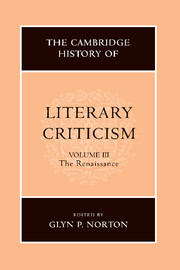Book contents
- Frontmatter
- Introduction
- READING AND INTERPRETATION: AN EMERGING DISCOURSE OF POETICS
- POETICS
- THEORIES OF PROSE FICTION
- CONTEXTS OF CRITICISM: METROPOLITAN CULTURE AND SOCIO-LITERARY ENVIRONMENTS
- VOICES OF DISSENT
- 40 The Ciceronian controversy
- 41 Reorganizing the encyclopaedia: Vives and Ramus on Aristotle and the scholastics
- 42 The rise of the vernaculars
- 43 Ancients and Moderns: France
- 44 Women as auctores in early modern Europe
- STRUCTURES OF THOUGHT
- NEOCLASSICAL ISSUES: BEAUTY, JUDGEMENT, PERSUASION, POLEMICS
- A SURVEY OF NATIONAL DEVELOPMENTS
- Bibliography
- Index
- References
44 - Women as auctores in early modern Europe
from VOICES OF DISSENT
Published online by Cambridge University Press: 28 March 2008
- Frontmatter
- Introduction
- READING AND INTERPRETATION: AN EMERGING DISCOURSE OF POETICS
- POETICS
- THEORIES OF PROSE FICTION
- CONTEXTS OF CRITICISM: METROPOLITAN CULTURE AND SOCIO-LITERARY ENVIRONMENTS
- VOICES OF DISSENT
- 40 The Ciceronian controversy
- 41 Reorganizing the encyclopaedia: Vives and Ramus on Aristotle and the scholastics
- 42 The rise of the vernaculars
- 43 Ancients and Moderns: France
- 44 Women as auctores in early modern Europe
- STRUCTURES OF THOUGHT
- NEOCLASSICAL ISSUES: BEAUTY, JUDGEMENT, PERSUASION, POLEMICS
- A SURVEY OF NATIONAL DEVELOPMENTS
- Bibliography
- Index
- References
Summary
The querelle des femmes was a pan-European but primarily French textual phenomenon. Although its successive attacks on, and defences of, women represent a rhetorical controversy between men about women, it was nonetheless one of the significant sites of gender debate in pre- and early modern Europe. The querelle survived sporadically in Europe for four centuries, but was not responsible for the changes in cultural and material settings and conditions necessary for women to become authors and publish their work. It tended, rather, to be symptomatic of factors for inertia and change beyond its bounds, or else functioned parallel to developments for and by women elsewhere: in England, for instance, women did not begin to counter misogynist attacks until comparatively late (Jane Anger, Her protection for women, 1589), and their challenges tend not to range beyond the internal authority, rules, and rhetoric of the querelle.
Its earliest feminist contribution, Christine de Pisan's Livre de la cité des dames (1405), initiated a mode of feminist literary criticism in the form of diagnosis and critique of the pathology of representations of women in the Western textual tradition, most immediately the Roman de la rose.
This diagnostic criticism challenged textual manifestations of masculine authority over women, exposing it as rooted in ideology rather than Nature and Reason as men claimed; as such, it was one of the founding conditions for women's writing other than ventriloquistic of the masculine tradition. However, its function was to serve broader challenges to misogyny rather than as specifically textual criticism.
- Type
- Chapter
- Information
- The Cambridge History of Literary Criticism , pp. 426 - 432Publisher: Cambridge University PressPrint publication year: 1999



